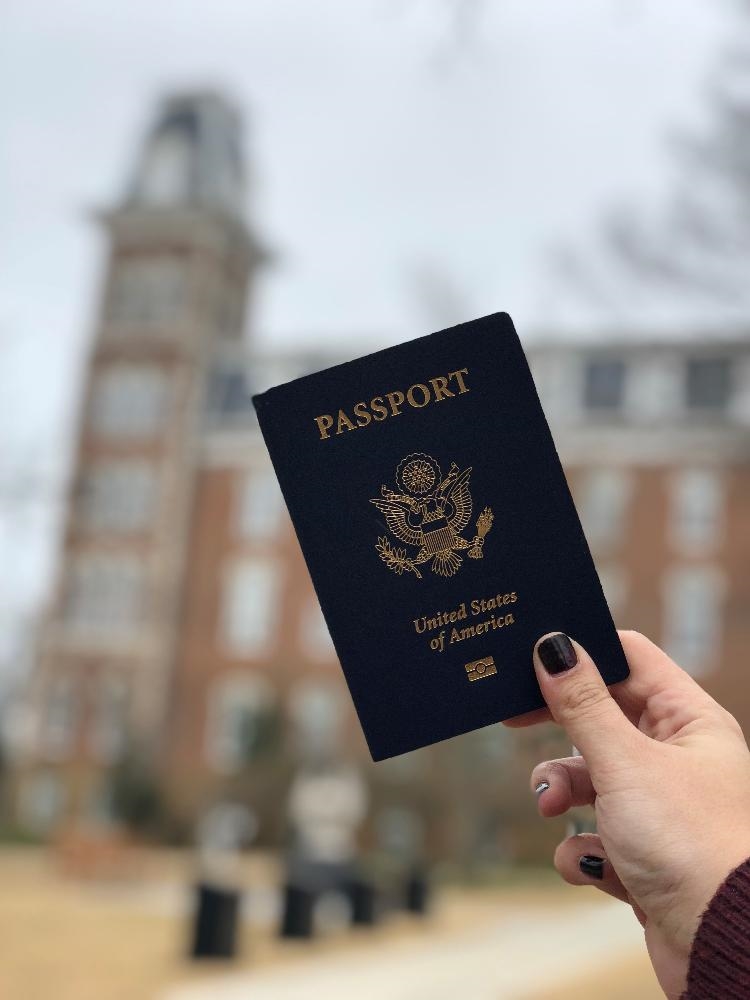The Office of Study Abroad has won a nationally competitive grant program with the Institute of International Education, providing scholarships to cover the costs of approximately 25 passports for Pell-eligible and other qualifying U.S. freshmen. The American Passport Project is designed to remove the first barrier for study abroad — funding for a passport. The University of Arkansas is one of 40 institutions selected to receive this inaugural grant, among 200 institutions that applied for the program.
Since winning the award, Engineering's ECAP program, the Office of Nationally Competitive Awards, the Honors College and Walton College have joined the passport project to significantly extend its impact. These additional funds mean that about 150 students will receive a passport in the 2021-2022 academic year.
The program is designed to promote equity in study abroad and support member institutions of the Institute of International Education in their efforts to encourage students to go abroad who would otherwise not participate in an international experience as part of their college education.
Students interested in the passport program or international travel programs can meet with a Study Abroad advisor at a drop-in information session from 11 a.m. to 1 p.m. Wednesday, Sept. 15, in the Multicultural Center, located in the Arkansas Union 403.
Bolstering DEI Strategies
Sarah Malloy, director of study abroad and international exchange at the U of A, said the Arkansas Global Opportunity, or Arkansas Go!, Passport Project bolsters the office's five-year strategic diversity, equity and inclusion plan to cultivate, strengthen and sustain a culture of inclusivity, diversity, equity, justice and citizen diplomacy amongst our office staff, faculty leaders, and most importantly the students we serve.
"Our campuswide partnerships and IIE's support means we are immediately able to meet one short-term goal of our plan — to establish the university's first passport scholarship program to increase access," Malloy said. "The passport project features holistic student support, mentorship, and requires campuswide partnerships — from initial selection to receiving a passport, to connecting students to existing financial resources, to affordable programs, and peer support upon return."
For students with limited means, studying abroad can seem unachievable because it can require long-term planning and it can involve financial hurdles, like the cost of a passport, which could keep a student from moving forward, said Katie Sabo, senior study abroad coordinator who is co-principal investigator for the IIE grant.
Closing Gap Between Interest and Reality
According to data from the Spring 2016 National Survey of Student Engagement, 54% of U of A freshmen students surveyed indicated that they were interested in, or planned to participate in, study abroad. Yet only 17.9% of that graduating class completed a study abroad experience.
"There is clearly a gap between interest and reality at the U of A for nearly 36% of our undergraduates," Malloy said.
Malloy said that receiving this grant reduces the first barrier to study abroad, having a passport, yet by strategically pairing access to a passport with a broad support network and holistic peer and professional support throughout the process, the university can further reduce barriers — lowering the nearly 36% disparity between student interest and going abroad.
In their long-term planning, the Office of Study Abroad has identified underrepresented groups who need additional programs and support to increase participation in Study Abroad experiences. This includes BIPOC students, LGBTQ+ students, students with disabilities, students with demonstrated financial need, gender diverse students, first-generation students, students who have never traveled abroad, and non-traditional age students.
"It has long been part of IIE's mission to increase participation and diversity in study abroad and to extend the benefits of international experiences for all students, regardless of socioeconomic status," Lindsay Gee Calvert, IIENetwork Lead, said on the organization's website.
Of the institutions selected by IIE, a majority were identified as minority-serving colleges or universities that are expanding their diversity, equity, access, and inclusion efforts by targeting these top 4 student populations: students with demonstrated financial need, racial/ethnic minorities, students who have never traveled abroad, and first-generation students.
About the Office of Study Abroad & International Exchange: The mission of Study Abroad and International Exchange is to facilitate opportunities to prepare University of Arkansas students to live and succeed in a global society. Study abroad enables students to develop critical skills needed to compete in today's global economy, including foreign language fluency, strong problem-solving and analytical capability, a tolerance for ambiguity, and cross-cultural competence. National studies show a positive correlation between students who study abroad and higher grade-point averages and degree completion rates.
Topics
Contacts
Sarah Malloy, director
Study Abroad and International Exchange
479-575-6624, slmalloy@uark.edu
Amy Unruh, director of communications
Graduate School and International Education
479-575-5809, unruh@uark.edu
